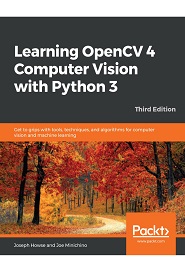
English | 2020 | ISBN: 978-1789531619 | 372 Pages | PDF, EPUB | 315 MB
Updated for OpenCV 4 and Python 3, this book covers the latest on depth cameras, 3D tracking, augmented reality, and deep neural networks, helping you solve real-world computer vision problems with practical code
Computer vision is a rapidly evolving science, encompassing diverse applications and techniques. This book will not only help those who are getting started with computer vision but also experts in the domain. You’ll be able to put theory into practice by building apps with OpenCV 4 and Python 3.
You’ll start by understanding OpenCV 4 and how to set it up with Python 3 on various platforms. Next, you’ll learn how to perform basic operations such as reading, writing, manipulating, and displaying still images, videos, and camera feeds. From taking you through image processing, video analysis, and depth estimation and segmentation, to helping you gain practice by building a GUI app, this book ensures you’ll have opportunities for hands-on activities. Next, you’ll tackle two popular challenges: face detection and face recognition. You’ll also learn about object classification and machine learning concepts, which will enable you to create and use object detectors and classifiers, and even track objects in movies or video camera feed. Later, you’ll develop your skills in 3D tracking and augmented reality. Finally, you’ll cover ANNs and DNNs, learning how to develop apps for recognizing handwritten digits and classifying a person’s gender and age.
By the end of this book, you’ll have the skills you need to execute real-world computer vision projects.
What you will learn
- Install and familiarize yourself with OpenCV 4’s Python 3 bindings
- Understand image processing and video analysis basics
- Use a depth camera to distinguish foreground and background regions
- Detect and identify objects, and track their motion in videos
- Train and use your own models to match images and classify objects
- Detect and recognize faces, and classify their gender and age
- Build an augmented reality application to track an image in 3D
- Work with machine learning models, including SVMs, artificial neural networks (ANNs), and deep neural networks (DNNs)
Resolve the captcha to access the links!